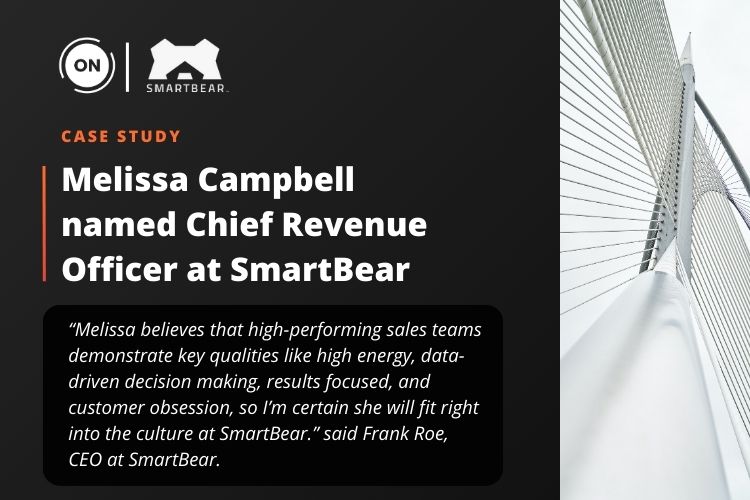ON Partners is proud to have collaborated with SmartBear in finding the organization’s Chief Revenue Officer.



Featured in Board Leadership Journal (March/April Issue) – The past year has seen one of the most volatile business environments in memory. Political, social, economic, health, and regulatory factors combined to form the perfect storm, creating a turbulent path for boards and those in the C-suite to navigate.
As a result, bringing together the right executive leadership team to unlock a brand’s potential has never been more critical, especially as the demand for leadership talent has increased moving into 2022. Building a board team with the right mix of experience and perspectives has arguably never been more important to an organization’s success.
This year, as business volatility continues owing to a confluence of factors including high inflation, ongoing supply chain issues, labor shortages, and, of course, COVID, board directors must have a heightened attentiveness and develop closer interactions with C-level executives. For 18 months, boards have been adjusting to remote board work, and that includes time with the operating executives. With everyone one step removed from historical face-to-face contact and relationship building, it has been easier to let items slip that would have been addressed or picked up through the nuance of time spent together.
At the same time, however, board members must remember their position of oversight and the importance of viewing the business through a long-term lens. This skill has become more difficult during the COVID crisis, and lines between a day-to-day and long-term focus have blurred. While directors were dealing with a once-in-a-century pandemic and the ensuing business issues, it was all hands on deck for members to roll up their sleeves on immediate, often life-preserving operational issues outside of the customary scope of directors. As the existential issues have faded, moving back to long-range strategy and governance is clear.
Boards should do a full effectiveness assessment every two to three years—and this would be an ideal time, given the changes to which they have had to adjust in operating environment, not to mention the same forces for the company they oversee.
Read the fully published article featuring Shawn Oglesbee, board services partner at ON Partners, in the March/April 2022 Issue of Board Leadership Journal here. Please note this article is behind a subscription paywall. Excerpts from the article include:
The supply chain crisis impacting US business since 2021 has contributed to the volatile environment. Less than two years ago, boards and C-suites were focused on risk mitigation, triple sourcing, nearshoring, and how to bring more manufacturing to Mexico and Latin America. Turning the business world upside down, the pandemic has brought supply chain directly into the limelight as never before. Board and C-suite focus has dramatically shifted toward planning, as supply chains become more complex and port issues and container costs—which in some cases are up 400%—move front and center.
As a result, boards have been interacting much more closely with the senior executives running the operational supply chain side of the business. For B2C companies, “traditional” supply chain talent had to pivot and come up to speed quickly on the interconnectivity of supply chains, the intersection of the supply chain, new product development, sales and finance, and the use of new technologies and new partners.
Diversity continues to be a high priority for boards. As more professional retained searches occur vs. “personal network” board hires, the onboarding process and time to be fully open and trusted is lengthened. This has only been exacerbated by the pandemic, where the personal time to build rapport and deepen relationships has been diminished.
Also, fewer restrictions currently exist around “CEO or big P&L experience only may apply.” Formal board skill assessments are increasingly common as well, which results in targeting functional leaders in high demand such as sitting chiefs of marketing, digital, or security. In privately held growth companies, VCs and founders are landing independ- ent directors earlier… post round B or C…not just in time for the S1 filing.
A greater governance focus on human capital matters has boards taking a more hands-on approach for several reasons. There is an emphasis on the board’s fiduciary duty to guarantee that the strength of the organization’s workforce is a corporate asset. Also, boards are recognizing that they must be well versed in key issues that fit the corporate and social agenda such as remote work, return to work strategy, employee health and safety, employee engagement, and diversity, equity, and inclusion initiatives. And for companies focused on success for a decade or more ahead, attention to human capital is paramount.
Increasingly, executives have been hedging one offer against another, which was until recently not common in the executive recruitment world. More and more, executives are sharing offers with other employers, then taking the best offer, and more offers are being declined. In this seller’s market, po- tential employees can ask for—and get—just about anything.
This can be attributed to a transition to a hired-gun environment as a result of COVID, with executives saying, “I’ll do whatever you want for as long as you want as long as I can work from home and don’t have to come into the office.” We’ve gone from an environment in which location/reloca- tion and being in the office five days a week were require- ments in 70% of executive searches to where it’s now just 20%. It has completely changed the recruitment game.
Follow our work, updates, and recent success on Twitter and LinkedIn.
Find our related successful placements of leading executives here.
Since 2006, ON Partners is the only pure-play executive search firm building diverse C-level and board leadership teams. We rebuilt the institution of executive search for the way you work. Our approach includes present partners who engage with their clients from the first brief to the final decision, individually crafted solutions that are unique to each client, and an easier experience all around. Named by Forbes as one of America’s Best Executive Recruiting Firms and to the Inc. 500/5000 Lists nine times, ON Partners is consistently ranked among the top 20 retained executive search firms in the U.S.
Untraditional by Choice. Original by Design. Since 2006.
If you want to create a new path – ON Partners knows how to help you get there.